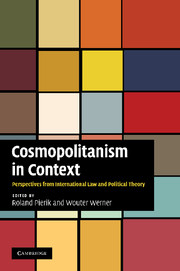Book contents
- Frontmatter
- Contents
- 1 Cosmopolitanism in context: an introduction
- Part I Environmental protection
- 2 Human rights and global climate change
- 3 Global environmental law and global institutions: a system lacking “good process”
- Part II World Trade Organization
- Part III Collective security and intervention
- Part IV International Criminal Court
- Part V International migration
- Part VI Conclusion
- Index
- References
3 - Global environmental law and global institutions: a system lacking “good process”
Published online by Cambridge University Press: 06 December 2010
- Frontmatter
- Contents
- 1 Cosmopolitanism in context: an introduction
- Part I Environmental protection
- 2 Human rights and global climate change
- 3 Global environmental law and global institutions: a system lacking “good process”
- Part II World Trade Organization
- Part III Collective security and intervention
- Part IV International Criminal Court
- Part V International migration
- Part VI Conclusion
- Index
- References
Summary
Introduction
This chapter illustrates the extent to, and manner in which, international environmental law has moved beyond the inter-state paradigm, central to classical international law, hence the term “global environmental law.” It makes the point that while elements that signify a departure from the inter-state paradigm can be identified in terms of both substantive law and institutional and decision-making patterns, global environmental law harbors a mismatch between these two interrelated aspects of law. On the one hand, substantive law reflects ideals associated with moral cosmopolitanism; on the other hand, the institutional and decision-making patterns take away from those ideals by the manner in which they empower global institutions. In global environmental law this development is particularly apparent in the South–North context. In this context, general principles that mark a departure from the discretionary role of states and instead reflect ideals of moral cosmopolitanism have been introduced. Concomitantly, global institutions, the World Bank in particular, have been endowed with discretionary public powers, powers that are exercised with regard to developing states and individuals and groups in developing states, in particular. This development entails that the ensuing legal system does not meet standards of justice, irrespective of whether justice is conceptualized as international, that is inter-state, justice, or in terms of moral cosmopolitanism, focusing on attaining justice for individuals. This essay, then, suggests that global environmental law, due to its institutional and decision-making patterns, ultimately does not focus on the equal moral worth of all persons and does not reflect the ideal that this understanding of persons results in the generation of obligations binding on all.
- Type
- Chapter
- Information
- Cosmopolitanism in ContextPerspectives from International Law and Political Theory, pp. 45 - 72Publisher: Cambridge University PressPrint publication year: 2010
References
- 2
- Cited by



